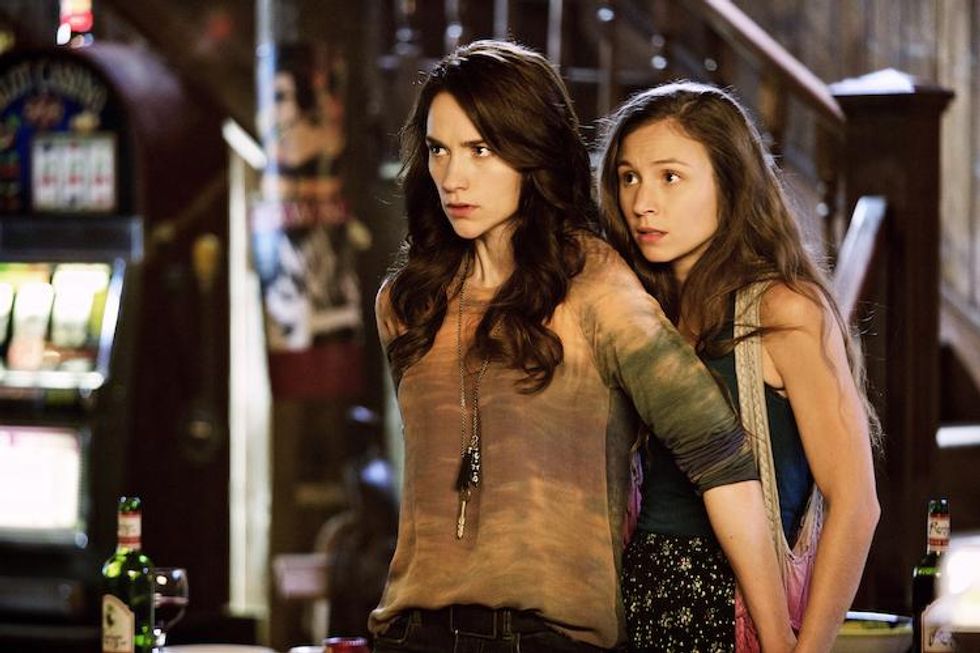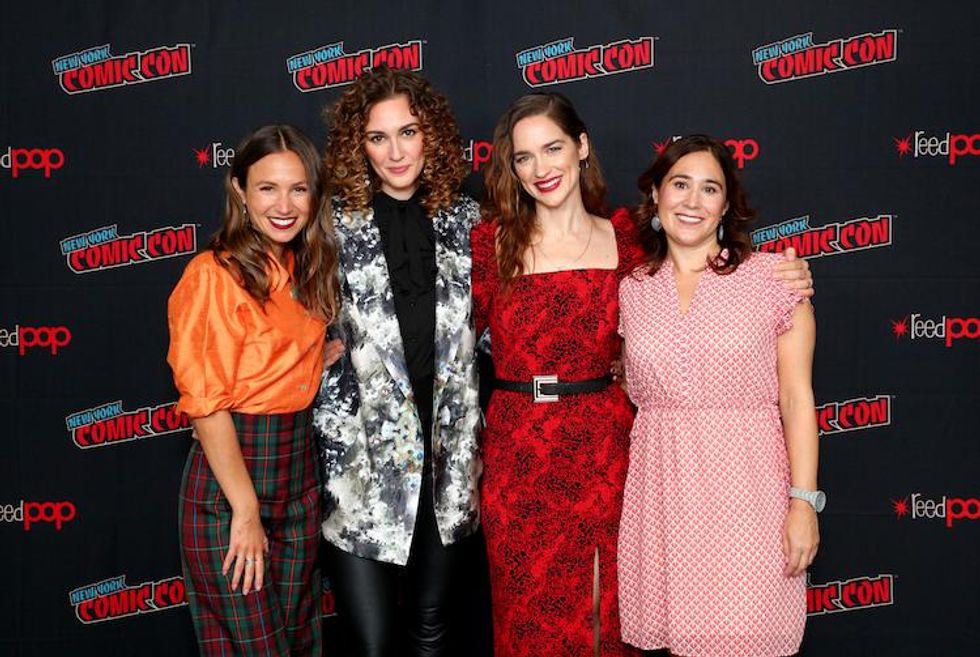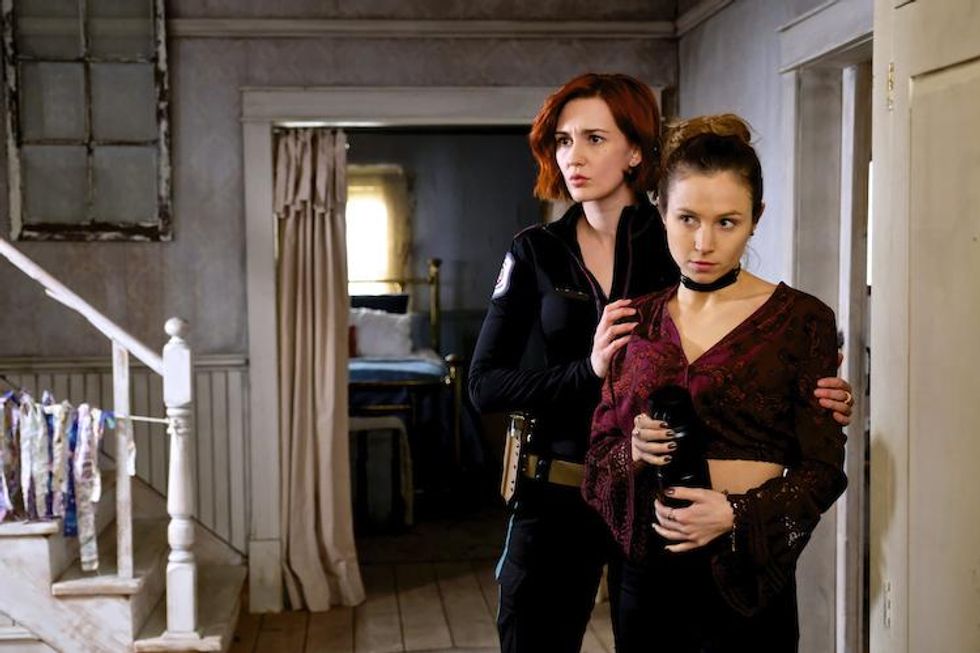As production in Hollywood was stalled amid the pandemic and there was a scramble to determine how best to get TV shows back up and running, in July, the Syfy series Wynonna Earp was among one of the first shows to get back to work to finish shooting its hard-fought fourth season.
Early in 2019, with tenuous funding for the fourth season, its fate was up in the air. Devoted fans of the supernatural series kicked off the #FightForWynonna campaign, which included electronic billboards in Times Square that emphasized their love for the series. When the TV industry at large shut down last March, it was another blow for Wynonna Earp, which had just begun production on season 4. It's not surprising that the series, pioneering in its continual subverting of the tropes of the Western genre by pulling women out of the domestic space and placing them in iconic, traditionally male roles with its lead character, a bounty hunter, and the town of Purgatory's sheriff (a lesbian, no less), was among the first to innovate and get back into production.
Wynonna Earp, like its scrappy team of demon hunters comprised mostly of women, including its sardonic and loveable titular lead (played by Melanie Scrofano) and/or queer people (with the exception of Tim Rozon's forward-thinking, 130-year-old immortal Doc Holliday), has been knocked down and come back fighting. And it continually bounces back stronger and more culturally vital than before, in part because of its unique symbiosis with its fandom. Nowhere is the show's vitality more apparent than in its depiction of "WayHaught," one of the most enduring and beloved queer couples on TV that includes Dominique Provost-Chalkley's bisexual Waverly Earp (little sis to Wynonna) and Katherine Barrell's Nicole Haught, the aforementioned lesbian sheriff.

Melanie Scrofano and Dominique Provost-Chalkley
The feminist, egalitarian, queer-to-the-core series (there's also a gay male couple played by Varun Saranga and Justin Kelly) from creator Emily Andras (Lost Girl) has built a legacy on its give-and-take with fans. It may also be the only series in TV history in which the actors playing queer characters in an enduring relationship found the space to speak publicly about their own queer identities during the run of the series. Barrell spoke about being bisexual in an interview in 2019, and Provost-Chalkley wrote a moving blog post about her queer identity for her 30th birthday at the same time the world went into lockdown in March. But the wide-open space that Andras created began several years ago.
"I was very immersed in queer culture and queer storytelling," Andras tells The Advocate about what she gleaned from Lost Girl, a supernatural story with a bisexual female lead. "Particularly insofar as delivering that through genre, and [I] realized there was just a huge amount of genre fans who identify as LGBTQIA and were not being served by genre stories."
"When I was given Beau Smith's comic book Wynonna Earp, a couple things really appealed to me.... With this one, I really did get goosebumps, because it had a really strong female character who is a bit of a mess. She was in a very traditional sort of male role. She was a descendant of Wyatt Earp, who is one of the most patriarchal heroes when you think of American culture and the Western myth," Andras says. "I grew up in Calgary, so the chance to come back here and make a Western really appealed to me. Also, when we think about the Western genre, we really think about who has been left out of that storytelling."
"It's so often from the viewpoint of, for example, the cowboy. The First Nations people are often made 'enemies,' for lack of a better term. Women are peripheral, or they're working in a brothel, and you would never see a queer character in a traditional Western," Andras adds.
"It was such a crazy pitch. I just had nothing to lose. I just took it to Syfy network and said, 'We really want to make it like Justified meets Frozen,'" Andras says about the series, which premiered in 2016. "I really wanted to make it about sisters and their love for one another."
Barrell's Nicole wasn't made a main character until the third season of Wynonna Earp, but even as a recurring character, from the moment she approached her love-to-be, Waverly, with equal parts gentleness and swagger in the town's watering hole Shorty's early in season 1, it was clear that the couple would become canon for queer women.
"One of my favorite things about [Nicole] is she never doesn't identify," Andras says. "She's never not out. She's always a lesbian from the first time you meet her. She's basically a deputy in a small town, but she never apologizes for who she is or for ambition. I feel like that's really encouraging for people to see."

Provost-Chalkley, Kat Barrell, Scrofano, Emily Andras
From the outset, the WayHaught love story actively pushed back against the negative tropes thrust upon queer women characters on TV, like the "bury your queers" phenomenon in which writers killed off lesbian and bisexual female characters in record numbers around the time Wynonna Earp premiered. Even before their speaking publicly about their own sexual identities, Barrell and Provost-Chalkley became fixtures at events where queer women gather, like ClexaCon. They were accustomed to commenting on the value of authentic and positive representation.
"I've always spoken about how seriously I take the WayHaught relationship and the playing of this character," Barrell says.
"I realized what a fortunate position I am in to work on Wynonna Earp and to be surrounded by the queer community and have been provided opportunities to talk about sexuality so much. Because I know it's helped me gain a better understanding and acceptance of it for myself," Barrell says. "I also have met the other side and realized, 'Oh my gosh, there are still people who can't, and that's so sad to me.'"
"I just hope we continue on this forward momentum...I have friends whose kids are tweens and teenagers, and they're all experimenting with their sexuality and everything's so fluid and open."
Wynonna Earp has offered a positive, lasting, playful, sexy, and sexual relationship between women, one that Andras says has moved her in terms of feedback she hears from older lesbians and bisexual women who never had that representation. Meanwhile, Provost-Chalkley credits Waverly with helping her along on her journey to being publicly out and to sharing that with the fans.

Barrell and Provost-Chalkley
"It gave me space to fully live this coming-out that I had decided was really important for me to step forward in my truth and do publicly, though I had come out to my family earlier in the year," she says. "It was the sort of the last step, really...speaking to the beautiful community that helped me get to where I am internally."
"I feel like I've come so far. These few years -- so much growth and understanding has come my way. And I feel so grateful in many ways that Waverly was the catalyst for me to have the courage to address those parts of myself," she says. "Had I not been gifted this beautiful bisexual character to play, I may not have got to this place now."
Andras says she was nearly moved to tears to bear witness to Barrell and Provost-Chalkley finding space to speak openly about their identities.
"It was really serendipitous with Kat and Dom. I made no assumptions about their sexuality; I just knew they were the perfect people for the role and that they had this sort of once-in-a-lifetime chemistry you can't really buy," Andras says. "Just seeing them really come to terms with their own sexuality insofar as their comfort level and their confidence expressing themselves, I think has been so joyful."
Throughout the years, Waverly and Nicole's physical attraction has been front and center, but when season 4 returned in its 10 p.m. time slot and the couple consummated their reunion after 18 months apart, things got racy with a powerful scene depicting sexual agency and desire between women that's rare for TV. And the fans went wild on social media.
"Oh, you noticed," Andras jokes about the inclusion of a full-on sex scene.
"Both Kat and Dom together share an extraordinary language and understand that they've made something that's its own thing beyond themselves, which is WayHaught," Andras says, adding that the scene is part of that reciprocity with the fans. "The audience has been so loyal to us. I feel like it was four years in the making, but at the same time, I would argue it arrived just in time. It really felt like the characters had earned this moment."
"I hope that the fans saw it as a gift because we certainly put in a lot of care and were very happy to put it out into the world for them," Andras says.








































































Charlie Kirk DID say stoning gay people was the 'perfect law' — and these other heinous quotes